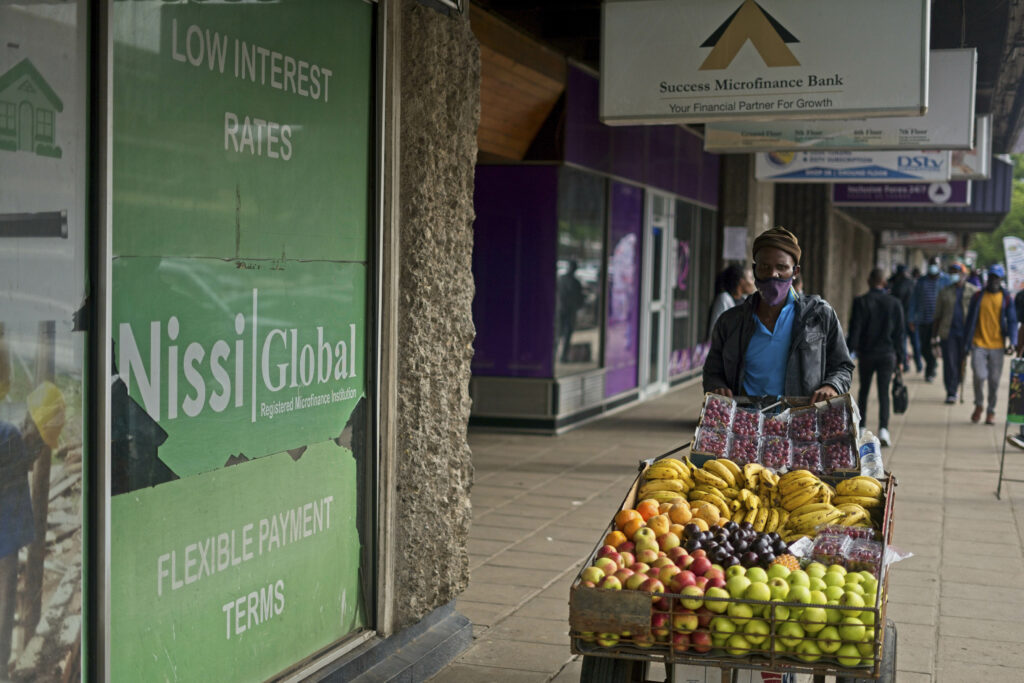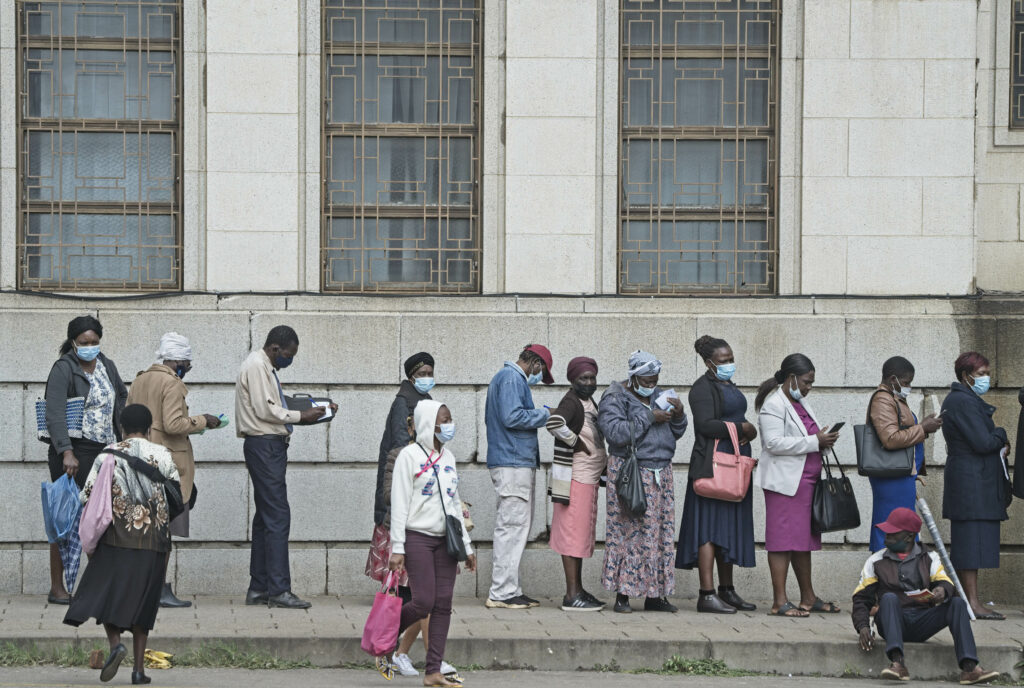An illegal money trader holds out a wad of ZImbabwe dollar notes on January 26, 2022, in the streets of Bulawayo, Zimbabwe. Inflation is on the rise leading to cash shortages.
Bra Mox was a fan of old Hollywood. The gangster movies of James Cagney, Edward G Robinson, Humphrey Bogart and other celluloid toughies of that era were his favourites, and in fact there was an unmistakable glint in his eye when he spoke about the real-life Al Capone. Those men were his heroes.
Listening to him, you could easily believe he had walked the streets of 1920s, 30s, 40s Chicago. He always spoke animatedly of “tycoons”. And for folks from his generation (he was born in the 1930s), the word “tycoon” was argot for monied street-smart guys who lived on the wrong side of the law. He saw himself as one of them and told tales of the time he had lived in South Africa. Looking back now, I imagine he walked the streets of Sophiatown – which in the 1950s was dubbed the Chicago of South Africa – before its demolition.
Bra Mox’s sartorial taste reflected his era: suits, ties and fedora hats, pointed shoes with a white patch at the toes and heels. You could never miss him. He looked like a dandy or a pimp, yet his photograph would not have been misplaced next to that of an immaculately dressed young Hastings Kamuzu Banda. And he was a legend and raconteur of note, at least to us young boys coming of age in a poor working-class township in Zimbabwe’s second city of Bulawayo in the 1990s.
He was an ominous presence, a wealthy loan shark whose name was known citywide. Cautionary tales abounded, that you tried to pull one over people like him at your own peril.
Despite his reputation of getting rich by exploiting people who were often unable to service loans they had taken up at criminal interest rates, desperation sent many knocking on his door. “Clients” left television sets, fridges, and even vehicles as surety, only to forfeit them after failing to pay off the loans.
This was called pinyoro, a Shona word which means “the transfer of possession of personal property from a debtor to a creditor”. It created a cruel cycle of proletarian poverty that would have infuriated Marx.
Bra Mox’s big house was stacked to the ceiling with every imaginable household chattel, and he could easily have turned it into an auction floor. This was back in the 1990s, but we were told he had begun this enterprise about two decades earlier.
Hyperinflation erodes incomes
Zimbabwe’s township history is full of such usurers, but they seemed to disappear when the economy hit the skids at the turn of the millennium, when incomes were eroded by hyperinflation and the local currency virtually became worthless.
It did not make sense for a loan shark to be in business or for anyone to visit a loan shark when the local dollar was losing value by the hour. How was interest to be pegged in such a volatile atmosphere? The usurers who remained found themselves out of business, at least in the “locations” or poor working-class townships.
It was ironic that a usurer could go bankrupt, but then such were the effects of world record inflation, at the time, which renowned economist Steve Hanke called a “monetary death spiral”.
Yet long before Zimbabwe’s economy took a hit at the sunset of the 1990s, usury was a fact of life for many working-class households. Women sold everything and anything, including mealies and vegetables, the once thriving municipality-run community beer halls also joined in the action, dishing out small loans to perpetually thirsty men in need of more than a tipple.
 A handcart vendor wades past a micro-finance company on January 26, 2022, in Bulawayo, Zimbabwe. Loans are extended to informal traders and youth entrepreneurs.
A handcart vendor wades past a micro-finance company on January 26, 2022, in Bulawayo, Zimbabwe. Loans are extended to informal traders and youth entrepreneurs.
There was nothing unusual about it, but the vendors were small-time: they operated on goodwill alone and did not demand any collateral. Yet it cannot be discounted that some of their “clients” became hooked to what looked like easy money and graduated to take loans from bigtime usurers such as Bra Mox.
The practice can be traced back to the pre-independence economic boom when the then-Rhodesia’s currency was at par with the British pound and had more heft than the US greenback. Even then, the need for extra cash during the course of the month was always present, be it among young men who liked to party and got broke with breakneck speed soon after opening the khaki envelopes that carried their wages, or middle-class types who lived beyond their means.
Scholars and researchers say immigrant communities during the Rhodesia Federation, which brought together present-day Malawi, Zambia and Zimbabwe, turned to usury to supplement their poor wages and became a favourite of some of Bulawayo’s notorious loan sharks.
I recall vividly, immigrant men from my father’s generation who had made the great trek to Southern Rhodesia back in the 1950s and 60s, but were now debt-ridden paupers who seemed resigned to perpetual calls to the loan shark.
When St Peter decided they had suffered enough, these economic émigrés left this earth without finishing paying off their debts, death being the ultimate escape. How the usurer dealt with the loss is another story altogether, yet it was not uncommon in Bulawayo for bereaved families to announce that whosoever was owed by the deceased could approach them after the burial with a list of what they were owed.
Usurers were known to keep fat ledgers, perhaps precisely for such an eventuality as the death of a client.
Loan sharks thrive post-independence
 The client files a seen on a desk inside a micro-finance company, working in his office on January 26, 2022, in Bulawayo, Zimbabwe. Inflation has crippled some money lending institutions as the government regulations enforce the use of local currency, which is depreciating.
The client files a seen on a desk inside a micro-finance company, working in his office on January 26, 2022, in Bulawayo, Zimbabwe. Inflation has crippled some money lending institutions as the government regulations enforce the use of local currency, which is depreciating.
Independence in 1980 birthed new loan sharks and new clients as Zimbabweans danced the dance of self-rule but with little money in their pockets. It was a reality that seemed inescapable and placed thousands on the vicious cycle of servicing usury loans. Also called chimbazo in local parlance, these schemes were run with such ruthless efficiency that the loan sharks amassed stupendous wealth on the backs of the poor.
There was no leniency for defaulters, with some desperate for cash using their homes as surety – and ultimately losing them. It was a public secret that some of the loan sharks amassed unbelievable real estate, owning dozens of houses across the city. In one Bulawayo township in the 1990s, a well-known loan shark lorded it over professionals such as lawyers who would have known better that this was an illegal enterprise, but made a beeline to access loans that would have to be paid off with an arm and a leg.
The association with lawyers was in fact a calculated “business” strategy: the lawyers – themselves beholden to the loan shark – were in charge of the legalities involved in transferring the properties of defaulters to the lenders.
But post-2000, as economic malaise descended on what was once one of Africa’s most promising young democracies and economic beacons, usurers, like everyone else, became casualties and their victims were hard-pressed to resist moments of schadenfreude.
As the usurers crawled back into the woodwork, the economy spawned “microfinance” firms, recognised as legal entities under the Banking Act, but still criticised by some as shameless shysters in suits and ties, sitting in airy offices.
The cycle of debt continued unbroken as the microfinance firms now targeted civil servants whose poor salaries, paid through the Salary Service Bureau, were guaranteed at the end of each month and could be garnished.
 People fill out forms while they queue outside a bank on January 27, 2022, in Bulawayo, Zimbabwe. Cash shortages fueled by inflation have affected money markets and the finance industry in ZImbabwe.
People fill out forms while they queue outside a bank on January 27, 2022, in Bulawayo, Zimbabwe. Cash shortages fueled by inflation have affected money markets and the finance industry in ZImbabwe.
‘January disease’
With the efficiency of loan sharks, the firms latched on what has become known as January disease – where reality catches up with “festive season” big spenders as school fees and other financial obligations beckon at the start of a new year. Microfinance firms and loan sharks became the go-to place – albeit with well-known dire consequences.
The year 2008 remains unforgettable particularly for civil servants, whose salaries were so eroded by inflation that at one time an entire month’s pay cheque could only buy a loaf of bread. By November that year, some international economists calculated Zimbabwe’s annual inflation at 89-sextillion percent, 79-billion percent per month, 98 percent per day!
Teachers became the biggest customers of these microfinance firms, but the repercussions soon became apparent, with local dailies carrying tonnes of adverts from auctioneers selling off household goods after defaulters failed to service their loans. Some microfinance firms even had their own auction floors in their back offices.
It was a shock then that after the country adopted a multi-currency regime, using mainly the US dollar and the South African rand, some usurers sprang back to action and still found customers willing to sign up for their pound-of-flesh schemes despite not earning their salaries in foreign currency.
Now, memories of 2008 have come back to torment Zimbabweans who are wondering why prices of goods are increasing daily despite being pegged in US dollars, rendering the greenback as useless as the local dollar. Loan sharks appear to have emerged, cashing in particularly on parents struggling to pay school fees for their children.
Even after the appointment of Oxford university professor Mthuli Ncube as finance minister – with the now-crushed expectation that he would fix the broken economy, Rambo-style – schools have been increasing fees each term, with some demanding “top-ups” along the way, citing rampant inflation.
Covid-19 adds pressure
The emergence of the Covid-19 pandemic only added to those migraines, with schools not wasting any time to demand tuition fees after parents complained that their children had stayed home during lockdown and not received any school tutoring.
Eager to keep their children in class, parents have turned to loan sharks, even while knowing it would be near impossible to pay off the debts.
In addition to amoral usurers, Zimbabwe’s economic hardships have also spawned a litany of get-rich-schemes that left many bruised. One early 2010s Ponzi scheme that left broken homes and broken hearts and is still the talk of Bulawayo was Geozing Pawnbrokers, which promised “investors” up to 35 percent interest on their money within thirty days.” It was clear the victims had never heard the dictum: “If it’s too good to be true, it probably is.”
Residents were to later learn that Geozing Pawnbrokers had opened other “branches” across the country. Despite the brazen illegality of the enterprise, senior cops, churchmen and politicians rushed to make investments, only to cry foul after the pawnbroker went bust.
As the economy enters yet another phase of untamed inflation, the vultures are circling in once again on desperate Zimbabweans, whose plight has been worsened by Covid-19 over the past two years: The pandemic. Covid-19 has exposed the cruelty of the usury business: without sources of income, breadwinners still knock on usurers’s doors, even while having no idea how they will pay back the money.
At a government office complex in Bulawayo, advertisements from six different microfinance firms were posted on a bulletin board, offering loans to civil servants which would effectively keep them trapped on the hamster wheel of debt.
Business must be good, I thought, for that many firms to sell the same service in such a constricted space. And then it occurred to me: Poverty and the spirit of capitalism sometimes run on parallel logic.